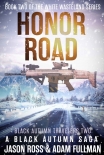Honor Road by Jason Ross (best non fiction books of all time TXT) 📕

- Author: Jason Ross
Book online «Honor Road by Jason Ross (best non fiction books of all time TXT) 📕». Author Jason Ross
“Well, yes. There’s a dam down by the town of Hurricane, but that’s not going to help us.” The polygamist pronounced Hurricane as hurry-kin. “I’m talking about the old, washed out impoundment above here.”
Isaiah gave Cameron the lay of the land and the scuttlebutt on what’d been going on in this valley since the collapse. Rockville was the next town up the Virgin River. Rockville and the town downriver, Virgin, were embroiled in some kind of war over water. The families were close enough to hear the shooting but far enough away to have nothing to do with it. The only bridge for miles had been blown up by Rockville to block raiding parties from Virgin.
The warring towns were ten miles apart, and the ghost town of Grafton sat squarely in the middle—but on the wrong side of the river for anyone to give-a-shit, which was lucky since between Isaiah and Cameron, they had seventeen, twenty-gauge shotgun shells and five bullets for Cameron’s Mosin-Nagant. If they had to fight, it’d be a short battle.
The other side of the river might as well have been the dark side of the moon—it was alien territory, where men from the towns had the energy and bullets to scrabble for advantage. On this side of the river, the two families slowly starved for lack of anything to put in their bellies.
“So what are you proposing we do about the dam? We barely have enough energy to walk across the yard,” Cameron argued.
Isaiah nodded. “I know. Hear me out. We don’t need to rebuild the impoundment to stop the river. We just need to scoop a little water out of the river and run it down the old bits of pipeline, then channel water into the stock tank at the top of the pasture.”
“Then what do we do with the water once it’s here?” Cameron felt ornery at the thought of work, so he made Isaiah explain.
“We dig a greenhouse into the ground and run water to it from the stock tank. We use the seed bank to start a garden,” Isaiah said.
In the back of Isaiah’s hastily-loaded pickup truck had been a can of “survival seeds;” an assortment of pre-packaged, vacuum-sealed vegetable seeds for a typical American garden. Neither Cameron nor Isaiah knew anything about gardening, but Ruth had kept a little garden in Wacko Wonderland. Growing a garden in the middle of winter seemed far-fetched, but an ear of corn sounded like Jesus in a gold chariot right now.
When they arrived at Grafton, Ruth had planted a dozen corn kernels, some tomato seeds and several squash beside the pioneer house on the sunny side. Each morning, her two boys carried water from the river in five gallon buckets.
A few of the seedlings had sprouted, and the tiny, green shoots looked like the first fruits of salvation punching through the dark, red soil. But the weather shifted. A few nights after the shoots emerged, a chill descended upon red rock country, and the morning mist froze to the ground like fairy dust around the tender seedlings. When the sun came out, it turned the crystals to vapor and the tender shoots twisted and crumpled, surrendering their energy back to the soil.
The daytime temperatures often soared into the sixties, but the night returned with the chill of the distant, snow-capped mountains. The awkward clan of straight-necked polygamists and jaded Southern California urbanites clung to the edge of Nevada desert on one side, and Utah alpine on the other. They broke a sweat working in the day, but chilled to the core at night. It was early December, and the life-robbing cold of night would likely worsen in the months to come. A garden seemed all but impossible.
Isaiah continued with his history lesson. “Mary Allen Mayfield grew turnips in the winter in Rockville. That was 1892, I believe, before the big flood of ‘95...” Cameron sighed forcefully and Isaiah hurried to his point. “Anyway, Mary Allen Mayfield dug trenches in the dirt and covered them with panes of glass. She had glass left over from the cabins that the flood destroyed. She glued the pieces together with clay.” Cameron sighed again. The nerd was unstoppable once he started. “Anyway, she built glass boxes over them and the sun warmed the ground enough for the shoots to survive the night frost. She grew turnips for Christmas dinner for everyone in town, which was only four families at the time.”
Turnips sounded very, very nice, but his reaction to anything out of the wife-grabber’s mouth was always the same. Disagreement and argument. “Even with miniature greenhouses, we would need water, and not water from the river. We’d burn more calories carrying water than we could grow in vegetables.”
Isaiah shifted in his seat and Cameron could guess what he was thinking. Carrying water was a sore subject. The polygamist kids always did the work while Cameron and Julie’s two boys watched.
What else would they expect? Isaiah and Ruth’s ten year-old daughter and twin eight year-old sons had grown up in a farming commune. Cameron’s boys were raised in a sea of tract homes. They didn’t know how to do chores. To get them to work, Cameron had to watch over them every second. Now that his boys were starving as well as incompetent, their usefulness had diminished to the level of house-cats. But they were still Cameron’s sons, and if his boys got to save precious calories while the polygamist brats did most of the work, that was no skin off his ass.
The polygamist kids were slowing down, too. Work and hunger went hand-in-hand in a downward spiral. The more the polygamist kids did chores, particularly carrying water, the hungrier they became.
Health issues arose. That afternoon, Ruth fell and hit the table in a dizzy spell. Several of the children were suffering from dry, flaky





Comments (0)